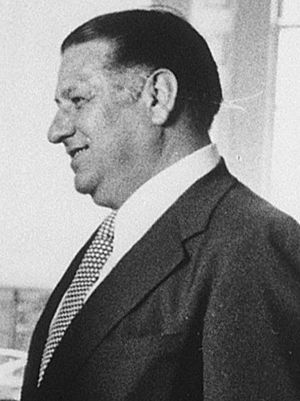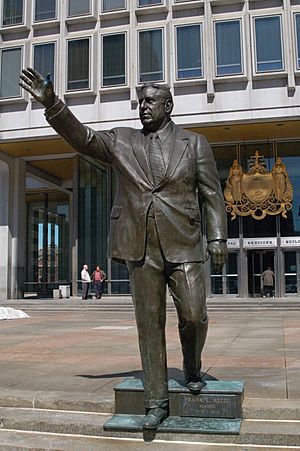Frank Rizzo facts for kids
Quick facts for kids
Frank Rizzo
|
|
|---|---|
 |
|
| 93rd Mayor of Philadelphia | |
| In office January 3, 1972 – January 7, 1980 |
|
| Preceded by | James H. J. Tate |
| Succeeded by | William J. Green III |
| Commissioner of the Philadelphia Police Department | |
| In office April 10, 1967 – February 2, 1971 |
|
| Preceded by | Edward Bell |
| Succeeded by | Joseph O'Neil |
| Personal details | |
| Born |
Francis Lazarro Rizzo
October 23, 1920 Philadelphia, Pennsylvania, U.S. |
| Died | July 16, 1991 (aged 70) Philadelphia, Pennsylvania, U.S. |
| Resting place | Holy Sepulchre Cemetery, Cheltenham Township, Pennsylvania, U.S. |
| Political party | Democratic (1971–1986) Republican (1986–1991) |
| Children | 2, including Frank Jr. |
| Military service | |
| Allegiance | United States |
| Branch/service | United States Navy |
| Years of service | 1938–1939 |
| Rank | |
Francis Lazarro Rizzo (born October 23, 1920 – died July 16, 1991) was an American police officer and politician. He served as the police commissioner for Philadelphia from 1968 to 1971. Later, he became the mayor of Philadelphia from 1972 to 1980.
Rizzo was a member of the Democratic Party for most of his career. In 1986, he switched to the Republican Party. He ran for office as a Republican during the last five years of his life.
Like many leaders at the time, Rizzo was against building public housing in neighborhoods that already existed. These neighborhoods were mostly home to white populations.
Rizzo was not allowed to run for a third term as mayor because of the Philadelphia City Charter. He tried to change the city rules to allow him to run again. However, this effort failed. The Philadelphia police department faced accusations of unfair treatment and not respecting people's constitutional rights. This was especially true for the black community. These issues were reported in a newspaper series that won a special award called the Pulitzer Prize.
Contents
Early Life and Career
Rizzo was born in Philadelphia. His father was also a police officer in the city. Frank grew up in a South Philadelphia neighborhood. He left high school during his senior year but later earned a diploma. He also took government classes.
Rizzo joined the United States Navy. He served on a ship called the USS Houston for 19 months. He was medically discharged because of a health condition. After leaving the Navy, Rizzo worked at a steel company. He helped make naval guns before World War II.
Becoming Police Commissioner
Rizzo joined the Philadelphia Police Department (PPD) in 1943. He moved up through the ranks and became a captain. In 1967, Mayor James H. J. Tate appointed Rizzo as the police commissioner. Mayor Tate continued to support Rizzo even with the challenges the city faced, especially with racial issues. Rizzo was known for being loud and serious, especially with the media.
Rizzo left his job as commissioner in 1971 to run for mayor.
Police and Community Relations
Rizzo's relationship with Philadelphia's black community was often difficult. The police department's reputation suffered among black people. Critics often said that Rizzo was unfair, especially when dealing with black neighborhoods.
During his time as commissioner, the department had a good percentage of black officers compared to other large U.S. cities. In 1968, 20% of officers were black. However, the hiring of black officers decreased sharply during his time as commissioner.
One well-known event under Commissioner Rizzo was a raid on the Philadelphia offices of the Black Panther Party in 1970. This happened before the Panthers planned a large meeting. The police searched the arrested Black Panthers in front of cameras. The pictures were shown in newspapers around the world. Days later, the charges against the Panthers were dropped because there was not enough evidence. The search was later ruled illegal.
As mayor, Rizzo's handling of the first MOVE incident in 1978 was also seen by some as unfair. When members of the group did not let city inspectors into their home, Rizzo used police action to remove them. Police officers surrounded the house, and about 1,000 officers blocked off the area. They did not allow food or water to enter. During the standoff, an officer was killed, and others were injured. The standoff ended with the arrest of the MOVE members.
Mayor of Philadelphia
First Election as Mayor
Rizzo ran for mayor in 1971. He faced other candidates in the Democratic primary election. He won the primary election.
In the main election in November 1971, Rizzo ran as a Democrat. He won against Thacher Longstreth. Rizzo did not use detailed campaign plans. His slogan, "firm but fair," explained his approach.
First Term as Mayor
Rizzo had opponents even at the start of his first term. A newspaper reported that a former mayor accused Rizzo of using the police for political reasons. This started a long disagreement between them.
Rizzo gave jobs to many local reporters who had given him good publicity as police commissioner. This caused some suspicion. Also, the ownership of the city's main newspapers changed. The new owners brought in younger journalists who focused on investigative reporting. This led to many critical stories about Rizzo's administration.
Rizzo was a conservative Democrat. He supported Republican president Richard Nixon in the 1972 election. In return, Nixon gave more federal money to Philadelphia. But this action upset many of Rizzo's supporters in his own party.
Second Term as Mayor
In the 1975 Democratic primary, Rizzo won again. In the November election, he defeated two other candidates.
During Rizzo's second term, a black community leader named W. Wilson Goode sued the city. He claimed there was unfair treatment based on race in the police and fire departments. The fire department was led by Joseph Rizzo, the mayor's brother. This lawsuit led to a plan called the "Philadelphia Plan." This plan aimed to help increase the hiring and promotion of minority groups in city jobs.
Rizzo's time as mayor also saw the creation of a city-funded agency to fight negative comments about Philadelphia. This agency famously led a boycott of a soap product after a TV commercial made fun of the city. The company then removed the commercial.
Construction began on a shopping mall called The Gallery at Market East. Work also started on the Center City Commuter Connection. This was a tunnel that connected the city's old railroad systems.
The Philadelphia Gas Works, which provided gas to the city, was taken over by the city during Rizzo's time. It then offered discounts for senior citizens and good contracts for city workers.
During his second term, two reporters wrote a series of articles about the Philadelphia police department. These articles described unfair treatment and not respecting people's rights. This series won a Pulitzer Prize.
Tax Increase and Recall Attempt
In his 1975 campaign, Rizzo promised to "hold the line on taxes." But soon after winning, he convinced the City Council to increase the city's wage tax. This made many of Rizzo's opponents angry. They tried to remove Rizzo from office through a "recall" effort. A group gathered many signatures to try and force a new election. However, the Pennsylvania Supreme Court ruled that the recall process was against the city's rules.
Attempt for a Third Term
Philadelphia had a rule that mayors could only serve two terms in a row. Rizzo convinced the Philadelphia City Council to ask voters to change this rule in 1978. If the rule changed, he could run for a third term in 1979. But voters strongly said no to the change. This stopped Rizzo from running in 1979.
Rizzo tried to run for mayor again later. In 1983, he lost to Wilson Goode, who became Philadelphia's first black mayor. In 1986, Rizzo became a Republican. He ran for mayor in 1987 but lost to Goode again.
In 1991, he decided to run for mayor one more time. He won the Republican primary election.
Later Life and Death
Between 1983 and 1986, Rizzo worked as a security consultant. He also hosted a popular radio talk show in Philadelphia. His son, Frank Rizzo Jr., later followed this tradition.
In 1980, Rizzo damaged a TV camera outside his house. He was surrounded by police officers who did not stop him. When a reporter tried to ask him about it, Rizzo offered to fight him and called him names.
On July 16, 1991, while campaigning for mayor, Rizzo had a serious heart attack. He passed away that day. Another person replaced him as the Republican candidate. Edward G. Rendell won the election and served two terms as mayor.
Legacy and Memorials

Rizzo's funeral was said to be the largest in Philadelphia's history. People lined the streets as the funeral procession went to the cemetery. He was buried in Holy Sepulchre Cemetery.
In his old neighborhood of South Philadelphia, there was a mural of Rizzo at the Italian Market. This mural was painted over in 2020.
A statue of Mayor Rizzo used to stand in front of Philadelphia's Municipal Services Building. This statue was paid for by private donations. After some public discussions, the statue was removed in June 2020. Mayor Jim Kenney said the statue was seen by many as a symbol of racism and police brutality.
Rizzo has been shown in movies like The Thin Blue Lie and The Irishman.
Images for kids
See also
 In Spanish: Frank Rizzo para niños
In Spanish: Frank Rizzo para niños
 | Charles R. Drew |
 | Benjamin Banneker |
 | Jane C. Wright |
 | Roger Arliner Young |




